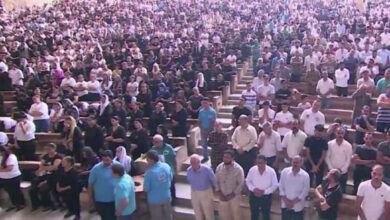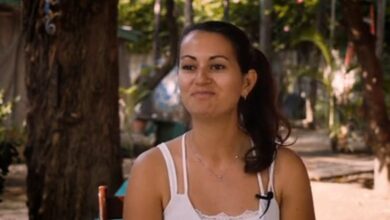Thousands of Salafis held a demonstration in front of the Ministry of Defense headquarters on Tuesday, calling for Egypt’s military rulers to release a priest's wife who they say converted to Islam and is now being held by the Coptic Church. Tuesday’s demonstration is described as one of the largest that Salafis have organized in recent years.
Kamilia Shehata was born in 1985 and is a school teacher who is married to a Coptic priest. Her family said that she was kidnapped by Muslims, an announcement that sparked a series of Coptic protests across Egypt, accusing Muslims of kidnapping her and forcing her to convert to Islam.
Meanwhile, Shehata was found later at a friend's house. It was revealed that she left home willingly after a conflict with her husband. The Coptic Church denied that Shehata converted to Islam.
However, the church’s announcement failed to end protests staged at a number of mosques, which called for Shehata's release and claimed the church was holding her against her will in a monastery.
Since then she has not appeared in public, and members of the Salafi movement say that she is in the Church’s custody.
The march started at midday from Al-Noor Mosque in Cairo’s northern area of Abassia, and after reaching the Ministry of Defense, protesters peacefully sat in the garden.
Protesters carried various banners attacking the Coptic Church and calling for Shehata’s release.
Among the messages on the banners were: “I want my sister Kamilia,” “Two-hundred-and-fifty hostages in Egyptian churches,” “How long will the Egyptian Church remain a state within a state?” and “Where is Kamilia Shehata?”
“There is a lot of evidence that Kamilia converted to Islam, and we only need to have her speak to the public," said Mohamed Karam, a law student at Ain Shams University. "I believe that the Church kidnapped her, and we want the military to respond to our demands to have her freed."
The newly established "Coalition to Support New Muslims" is the main group behind the demonstration. The coalition was established last month for the sake of helping Egyptian Copts who convert to Islam.
The coalition is not simply another Salafi group; it also contains influential Islamic figures, such as Sheikh Hafez Salama, the leader of the popular resistance committee against British colonial troops in 1956, said Karam.
Representatives of Salafi protesters met Prime Minister Esaam Sharaf to request him to intervene for Shehata’s release.
Moreover, dozens of Salafis rallied on Tuesday before the State Council, while a lawsuit demanding the release of Shehata was reviewed by the Administrative Court. The lawsuit accused the church of kidnapping Shehata after she had converted to Islam.
“The coalition is trying to be active now and to have its voice heard. Through this march we are telling people that we haven't forgotten our sister Kamilia,” added Karam.
Shehata was a main focus for Salafi activism in 2010, with several marches conducted in Alexandria calling for her release and attacking Coptic religious leader Pope Shenouda III.
Experts argue that the rise of Salafis and other Islamic factions could ignite sectarian tensions in the country after the fall of former President Hosni Mubarak’s regime.
Last month, a church in Atfeeh, Helwan, was set on fire by an angry Muslim mob. Several Coptic homes were also looted and torched. Moreover, at least ten Coptic Christians were shot dead and 110 wounded by gunfire in religious clashes in the poor working-class district of Moqattam. This month, in the Upper Egyptian governorate of Qena, massive protests flared up against the appointment of a Christian governor.
Media portrayed the protests as being designed by Salafis, and on Monday, an influential Salafi preacher told the privately owned TV channel ONTV that Copts are not entitled to rule Muslims.
“Regarding the church in Atfeeh, Salafis were there to solve the crisis, not ignite it. Nobody can deny the media’s manipulation to hold Salafis responsible for any problem in the country,” said Mohamed al-Moataz be-Allah, a twenty-eight-year-old Salafi man.
Asked about the reasons behind their deep interest in challenging and attacking the Coptic Church in Egypt, al-Moataz be-Allah argued that “the Muslim Brotherhood is involved in politics and left no room for defending Islam. Salafis are doing this task now.”
The Salafis are adherents of a rigid interpretation of Islam that claims to hearken back to the early days of the religion. They distance themselves from concepts such as democracy and citizenship, alleging that such concepts are un-Islamic.




